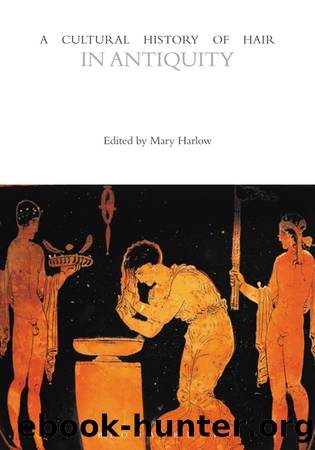A Cultural History of Hair in Antiquity by Mary Harlow;

Author:Mary Harlow;
Language: eng
Format: epub
Publisher: Bloomsbury UK
FIGURE 7.2 Figure of a Celtic warrior, early Roman period, terracotta. © Ashmolean Museum, University of Oxford.
HAIR AS A RACIAL SIGNIFIERâAFROED ETHIOPIANS AND REDHEADED GAULS
Hair was, and remains still, an effective means of categorization. As Synnott summarized: âopposite sexes have opposite hair, head hair and body hair are opposite, opposite ideologies have opposite hair.â38 In the obsessive pursuit of categorization, ancient authors also turned to hair not only as a marker of cultural evolution, or lack thereof, but also as a characteristic of racial identity. Hair as a marker of race was regularly explained in relation to natural environment, predicated upon the assumption that location influenced physical features. This theory surfaced in the writings of Herodotus as seen in his explication of the pleasing temperaments and physiques of the peoples of Asia Minor, which he attributed to the temperate climate (1.142). Geography and climate were also used to explain less appealing characteristics of the same peoples, such as their lack of energy, willpower, courage, and fortitude, which ultimately rendered them servile to the yoke of monarchy (1.143). The effects of environment were emphasized in the Hippocratic text, Airs, Waters, Places,39 which became the most important and influential text in antiquity on the topic of humanity and indeed race and environment.
Representations of the Ethiopians40 in both Greek and Roman literature placed emphasis on the influence of environment and climate on both physical characteristics, interpreted by the ancients as racial features, as well as temperament.41 The racial classification of the Ethiopians was partly based on the fixation ancient Mediterranean authors had with the ethnography of hair, which was part of their racial taxonomy. Herodotus (7.70), for example, described the hair of the African Ethiopians with the superlative οá½Î»ÏÏαÏον (woolliest) as distinct from the Asiatic Ethiopians, described as ἰθÏθÏιξ (straight-haired).42 While Herodotus did not attribute location and climate to the hair or other physical features of the Ethiopian peoples, the connection came in later writings, such as the works of Aristotle where there was a direct connection made between woolly hair and a dry environment.43
In Ptolemyâs Tetrabiblos, the theory was extended to incorporate the role of astronomical and, expressly, astrological cycles. On the Ethiopians, for example, Ptolemy wrote:
The features of all national characteristics are established in part by entire parallels [north or south] and angles [east or west], through their position relative to the Elliptic and the Sun. The region we inhabit is in one of the Northern Quarters, but the peoples who live under the more southern parallels, that is, those from the equator to the summer tropic, since they have the Sun in their zenith are constantly burned by it. Thus they have black skins and thick, woolly hair, are contracted in form and shrunken in stature. They are sanguine of nature, and in habits they, for the most, are part savage because their homes are continually oppressed by the heat; we call them by the general name Ethiopians. Not only do we see them in this condition, but we likewise
Download
This site does not store any files on its server. We only index and link to content provided by other sites. Please contact the content providers to delete copyright contents if any and email us, we'll remove relevant links or contents immediately.
| Buddhism | Christianity |
| Ethnic & Tribal | General |
| Hinduism | Islam |
| Judaism | New Age, Mythology & Occult |
| Religion, Politics & State |
Cecilia; Or, Memoirs of an Heiress — Volume 1 by Fanny Burney(32176)
Cecilia; Or, Memoirs of an Heiress — Volume 3 by Fanny Burney(31569)
Cecilia; Or, Memoirs of an Heiress — Volume 2 by Fanny Burney(31525)
The Secret History by Donna Tartt(18426)
Sapiens: A Brief History of Humankind by Yuval Noah Harari(14053)
Leonardo da Vinci by Walter Isaacson(12932)
The Radium Girls by Kate Moore(11734)
Sapiens by Yuval Noah Harari(5179)
How Democracies Die by Steven Levitsky & Daniel Ziblatt(5025)
The Wind in My Hair by Masih Alinejad(4915)
Homo Deus: A Brief History of Tomorrow by Yuval Noah Harari(4732)
Endurance: Shackleton's Incredible Voyage by Alfred Lansing(4559)
The Silk Roads by Peter Frankopan(4327)
Man's Search for Meaning by Viktor Frankl(4327)
Millionaire: The Philanderer, Gambler, and Duelist Who Invented Modern Finance by Janet Gleeson(4187)
The Rape of Nanking by Iris Chang(4058)
Joan of Arc by Mary Gordon(3876)
The Motorcycle Diaries by Ernesto Che Guevara(3852)
Hitler in Los Angeles by Steven J. Ross(3826)
